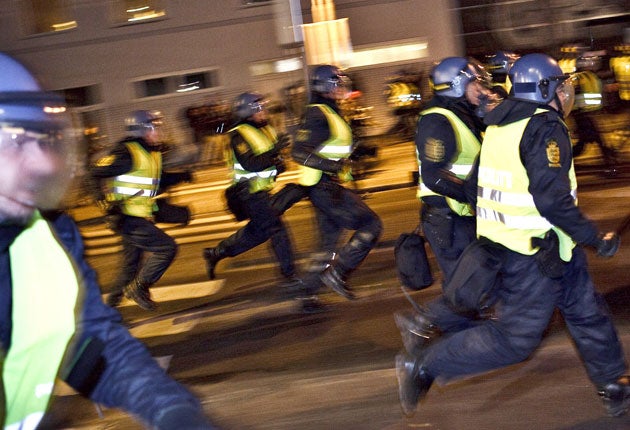Hopes of global emissions deal at Copenhagen begin to fade
more arrests as police take zero-tolerance approach to protesters

Your support helps us to tell the story
From reproductive rights to climate change to Big Tech, The Independent is on the ground when the story is developing. Whether it's investigating the financials of Elon Musk's pro-Trump PAC or producing our latest documentary, 'The A Word', which shines a light on the American women fighting for reproductive rights, we know how important it is to parse out the facts from the messaging.
At such a critical moment in US history, we need reporters on the ground. Your donation allows us to keep sending journalists to speak to both sides of the story.
The Independent is trusted by Americans across the entire political spectrum. And unlike many other quality news outlets, we choose not to lock Americans out of our reporting and analysis with paywalls. We believe quality journalism should be available to everyone, paid for by those who can afford it.
Your support makes all the difference.Gordon Brown will travel to the UN Climate Change Conference in Copenhagen tomorrow, two days ahead of most other world leaders, in an attempt to to break the deadlock over a new global-warming agreement.
Any accord looks a long way off, with substantial differences remaining between developed and developing countries about what the world needs to do in the face of rising global temperatures, and how to pay for it. Meanwhile outside the conference hall, police were taking a tough approach to thousands of climate-change activists who have descended on the city to push for an agreement before the conference concludes on Friday. Yesterday, around 200 hundred activists were arrested as they attempted to march on Copenhagen docks in protest at emissions from worldwide shipping. This followed the arrest of nearly 1,000 protesters on Saturday during a march in the city.
By flying out tomorrow, Mr Brown is hoping to raise the ambition of the final agreement, so that targets for cutting greenhouse-gas emissions are tough enough to restrict global warming to no more than C above pre-industrial levels, the limit regarded as the threshold of dangerous climate change. Achieving this is by no means certain since there is a wide range of potential targets for both developed and developing countries. The Independent reported on Saturday that the targets are still inside square brackets in the negotiating text, meaning that none has yet been agreed.
The Prime Minister will hold meetings with a "small number" of world leaders away from the conference on Wednesday to try to establish common ground, although it is known that President Obama is not among them. Securing such an agreement could prove to be a notable political coup for Mr Brown with an election no more than six months away. But Downing Street sources stressed that Mr Brown's intent was not to secure any agreement at any price, but to make sure the deal that was done was of the highest ambition possible. "He is totally convinced that this is the moment we have to grapple with the problem, and if the moment slips, we may not be able to resurrect the deal for five years," said a Downing Street source. "That would be five years more of carbon emissions. He is hugely focused now on how the deal can be pieced together, just as he was with the G20 Summit in April. But this is harder than that."
Ed Miliband, the Secretary of State for Energy and Climate Change, is currently leading the conference negotiations for the UK and yesterday attended a long meeting of 40 environment ministers who were discussing the proposed treaty text that was tabled on Friday. He said last night: "We're now getting close to midnight in this negotiation and we need to act like it. That means more urgency to solve problems not just identify them, more willingness to shift from entrenched positions and more ambitious commitments. If we want to do a deal, we will all need to create greater momentum and make active efforts to find solutions. We need more progress before the leaders arrive."
It was clear from the environment ministers' discussion group that there remain wide differences over emissions targets for the developed and for the developing world, and over the financial help which the rich countries agree in principle must be given to the developing nations to help them to grow in a low-carbon way. There is also a procedural problem which may prove the most intractable of all, concerning whether there should be a single agreement at Copenhagen, or two. The developed nations – including the UK – want a completely new treaty which would encompass the world's two biggest carbon emitters, China and the USA. Neither of them is covered by the current Kyoto protocol: China because developing nations are not committed to do anything by the protocol; and the USA because President George W Bush withdrew the US from it in 2001.
But the developing countries are fiercely attached to Kyoto, precisely because it commits them to nothing and puts commitments on the rest of the developed world which are legally binding. They are strongly committed to having Kyoto, which runs out in December 2012, renewed at Copenhagen, with new commitments for the rich world.
Join our commenting forum
Join thought-provoking conversations, follow other Independent readers and see their replies
Comments